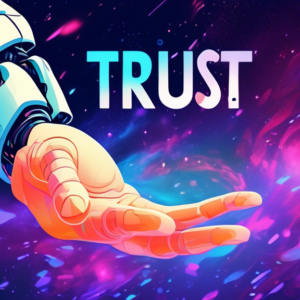Trust in Artificial Intelligence: A Leap of Faith
Artificial intelligence (AI) is rapidly infiltrating every aspect of our lives, from the mundane to the life-altering. It powers our virtual assistants, personalizes our online experiences, assists in complex medical diagnoses, and even takes the wheel in self-driving cars. As AI systems become increasingly sophisticated and autonomous, a critical question emerges: can we truly trust them? Trusting artificial intelligence requires a significant leap of faith, one that demands a deep understanding of its capabilities, limitations, and the ethical implications of its burgeoning presence in our world.
Understanding the Nature of AI
Before grappling with the concept of trust, it’s crucial to demystify artificial intelligence. At its core, AI seeks to replicate human-like intelligence in machines, enabling them to perform tasks that typically require human cognition, such as learning, problem-solving, and decision-making. This is achieved through various approaches, including:
- Machine Learning (ML): Algorithms that allow computers to learn from data, identifying patterns and making predictions without explicit programming.
- Deep Learning (DL): A subset of ML employing artificial neural networks with multiple layers, enabling the processing of vast amounts of data and complex pattern recognition.
- Natural Language Processing (NLP): AI that focuses on enabling computers to understand, interpret, and generate human language.
- Computer Vision: AI systems that can see and interpret images and videos, mimicking human visual perception.
While these technologies are undoubtedly impressive, they operate based on algorithms and data, making them susceptible to biases, errors, and unforeseen consequences.
The Foundations of Trust: Transparency, Accountability, and Explainability
Building trust in AI requires addressing fundamental concerns surrounding its transparency, accountability, and explainability.
Transparency: Unveiling the Black Box
Many AI systems, particularly those utilizing deep learning, operate as black boxes. The decision-making process remains opaque, making it challenging to understand how they arrive at specific conclusions. This lack of transparency breeds suspicion and hinders trust. To foster confidence, developers must strive for greater transparency, providing insights into the data used, algorithms employed, and the reasoning behind AI-driven decisions.
Accountability: Who Bears the Responsibility?
As AI systems make decisions that impact our lives, establishing clear lines of accountability becomes paramount. When an AI-powered medical diagnosis goes wrong, or a self-driving car malfunctions, who is responsible? Is it the developer, the user, or the AI itself? Defining legal and ethical frameworks for AI accountability is crucial for building trust and ensuring that consequences for errors or misjudgments are addressed fairly.
Explainability: Making AI Decisions Understandable
The ability to explain AI decisions in a way that humans can comprehend is crucial for building trust, especially in sensitive domains like healthcare, finance, and criminal justice. Explainable AI (XAI) aims to develop methods and techniques that provide insights into the reasoning behind AI recommendations, allowing humans to understand, trust, and effectively manage these powerful systems.
Ethical Considerations: Navigating the Moral Maze
As AI becomes increasingly intertwined with our lives, it presents a host of ethical considerations that require careful examination:
Bias and Fairness: Confronting Algorithmic Prejudice
AI systems are trained on massive datasets, which can reflect and amplify existing societal biases. This can lead to discriminatory outcomes, perpetuating inequalities in areas like loan applications, hiring processes, and even criminal sentencing. Addressing bias in AI requires diverse training data, rigorous testing for fairness, and ongoing monitoring to mitigate potential harm.
Privacy and Data Security: Safeguarding Sensitive Information
AI thrives on data, often requiring access to vast amounts of personal information. Ensuring the privacy and security of this data is paramount. Robust data protection measures, anonymization techniques, and strict regulations are essential for preventing misuse and fostering trust.
Job Displacement: Adapting to the Changing Workforce
The automation potential of AI raises concerns about job displacement. While AI will undoubtedly create new opportunities, it also threatens to render certain roles obsolete. Preparing for this shift requires investing in education and training programs that equip individuals with the skills needed for the jobs of the future.
Building Trust: A Collective Effort
Cultivating trust in AI is not solely the responsibility of developers or policymakers; it requires a collaborative effort involving stakeholders across society.
Fostering Public Understanding
Demystifying AI and promoting digital literacy is crucial for building public trust. Educating individuals about the capabilities, limitations, and potential impact of AI empowers them to engage in informed discussions and make responsible choices.
Collaboration and Open Dialogue
Addressing the complex challenges posed by AI requires collaboration between researchers, developers, policymakers, ethicists, and the public. Open dialogue, sharing best practices, and establishing ethical guidelines will be crucial for navigating the evolving landscape of AI.
Regulation and Governance
While fostering innovation is important, appropriate regulations are needed to mitigate the risks associated with AI. Establishing clear guidelines for data privacy, algorithm transparency, and accountability can help build public trust and ensure the responsible development and deployment of AI technologies.
Conclusion: A Leap Worth Taking?
Trusting artificial intelligence is not about blind faith; it’s about informed confidence built on transparency, accountability, and a commitment to ethical development and deployment. As AI becomes increasingly sophisticated, we must approach its integration into our lives with a healthy dose of caution and a unwavering dedication to harnessing its power for good. The leap of faith required to trust AI is a leap worth taking, but only if we proceed thoughtfully, responsibly, and with a shared vision for a future where AI empowers humanity, rather than diminishes it.
